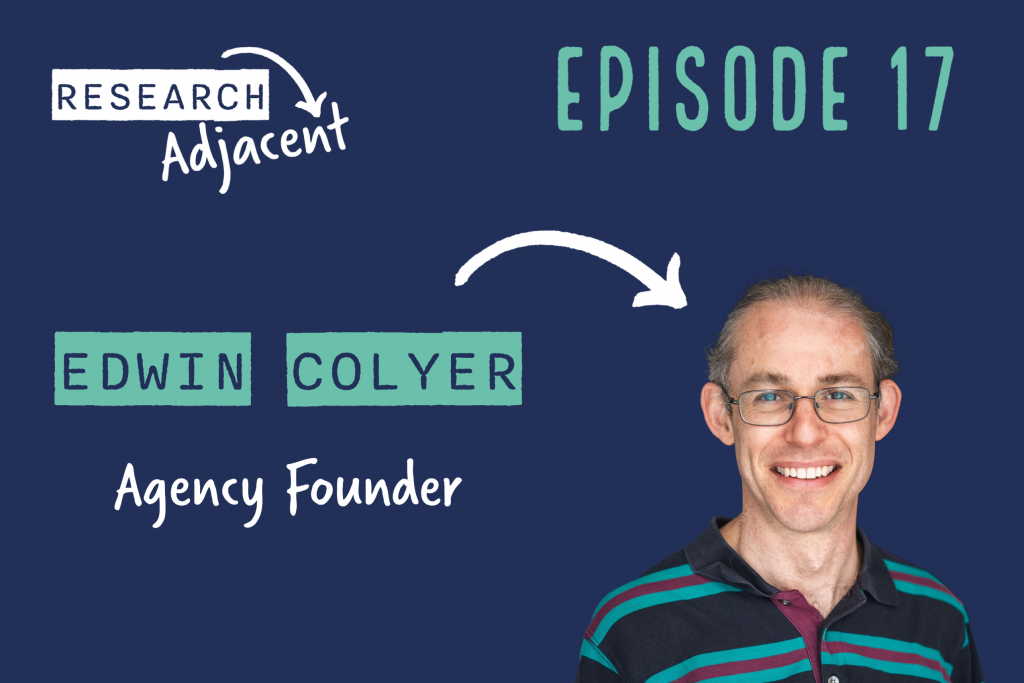Edwin Colyer, Agency Founder (Episode 17) | Edwin is joining the dots between communications, engagement and impact

For episode 17 of Research Adjacent Sarah’s guest is Edwin Colyer. Edwin is the founder of the research communications and engagement agency, Scientia Scripta. This venture pulls together everything he has learned from many years as a science journalist, as well as his experience as university impact manager.
Telling stories about science
Edwin originally studied biochemistry, but soon realised he didn’t have the patience needed for lab work. His next step was to study history of science where he discovered a love of words. This was in the mid-90s when science communication was just emerging as something of a career so he took the leap into freelancing. He was soon writing feature articles for newspapers and magazines which led to nearly 20 years as a science writer. Highlights during this time included copyediting for a David Attenborough book and writing for New Scientist.
“One of my first pieces was actually for New Scientist. I got lucky! And I remember I did a course with them and they talked about the idea that you’ve got to paint a picture. You’ve got to suck somebody in right at the beginning so that they’re hooked.“
Stories with impact
In the mid 2010s when impact was rising in prominence Edwin decided to go back into a regular job, taking up an impact manager position at Manchester Metropolitan University. He realised that creating impact case studies would need both his storytelling skills and his journalistic talent for gathering evidence.
“As an impact manager, you’re still telling a story. Even if part of that role is helping people to think about their plans and their ambitions and where they think their research is going and how they want to make the world a better place. But that in itself is a story. You’re trying to help people see what that story might look like and how you can make it reality.“
Something that was both a challenge, and ultimately a gift, was moving from freelancing into a job with a boss, colleagues, and regular hours. Having been told that “the university liked mavericks” he took that as an invitation to bend the rules at times and relished the opportunity to learn how a big organisation worked. This is learning he is now using as he builds his own company.
“I can now translate a lot of my experiences and what I learned and what I observed in being in a big organisation. I can now choose how to how to apply that in Scientia Scripta. So what do I want the culture to be like? How do I interact with colleagues? All of that kind of stuff is stuff that I would have never have learned about without being an employee.“
Embedding impact from the outset
In his time as an impact manager Edwin developed a deep understanding of what really goes into creating impactful research and the importance of collaboration, engagement and involvement, not just communication. After a long time telling stories about research which has already been completed, he is now relishing the opportunity to be involved in projects from the outset. One thing he is currently working on is a very topical project on ethics in AI. He was a collaborator right from the start, helping to develop the funding bid, and is now working alongside the researchers.
“It’s all about training and then supporting AI and data scientists to integrate community engagement into their research process. It’s quite radical and very interdisciplinary. And it’s probably not done that much in AI research at the moment even though our research showed that public involvement and diversity of voices in the development process is absolutely critical to sort of developing more ethical AI.“
Connecting people and purpose
Edwin’s focus is now on building his agency and thinking about what it means to create a positive workplace culture and an impactful business model. Creating connections is a core part of this and he is even exploring setting up a network for science communicators in the Manchester area.
“One of your key roles is connecting people, even in the same institution, who didn’t know each other and didn’t know that they were working on very similar things. I really value the networks that I’ve built up and you start to see patterns that other people don’t because you’ve just got all these really interesting connections going on.“
And making these connections extends beyond people, to joining the dots between impact, engagement and communications to – as his website says – make the world a kinder, fairer and more sustainable place.
Find out more
- Connect with Edwin on LinkedIn
- Find out more about his agency Scientia Scripta
- Check out the David Attenborough book he worked on
- Read the Lister Institute’s special 125th Anniversary report which Edwin wrote
- If you’re a freelance writer/content creator you can join Scientia Scripta’s roster here
Theme music by Vitaliy Levkin from Pixabay
Join our gang! Sign up to our mailing list
Are you a current or aspiring research-adjacent professional? Or are you just research-adjacent curious? It doesn’t matter, everyone is welcome in our gang! Join our mailing list using the form below and you will receive podcast updates (of course) plus interesting articles, reports, career tips and resources. You can unsubscribe any time.